Key takeaways:
- Humor fosters connections by creating a sense of belonging, easing difficult conversations, and enhancing communication among individuals.
- Recognizing the audience’s demographics, mood, and interests is crucial for tailoring humor effectively to connect with them.
- Building authentic connections often stems from shared vulnerability, where humor serves as a bridge to deeper, meaningful conversations.
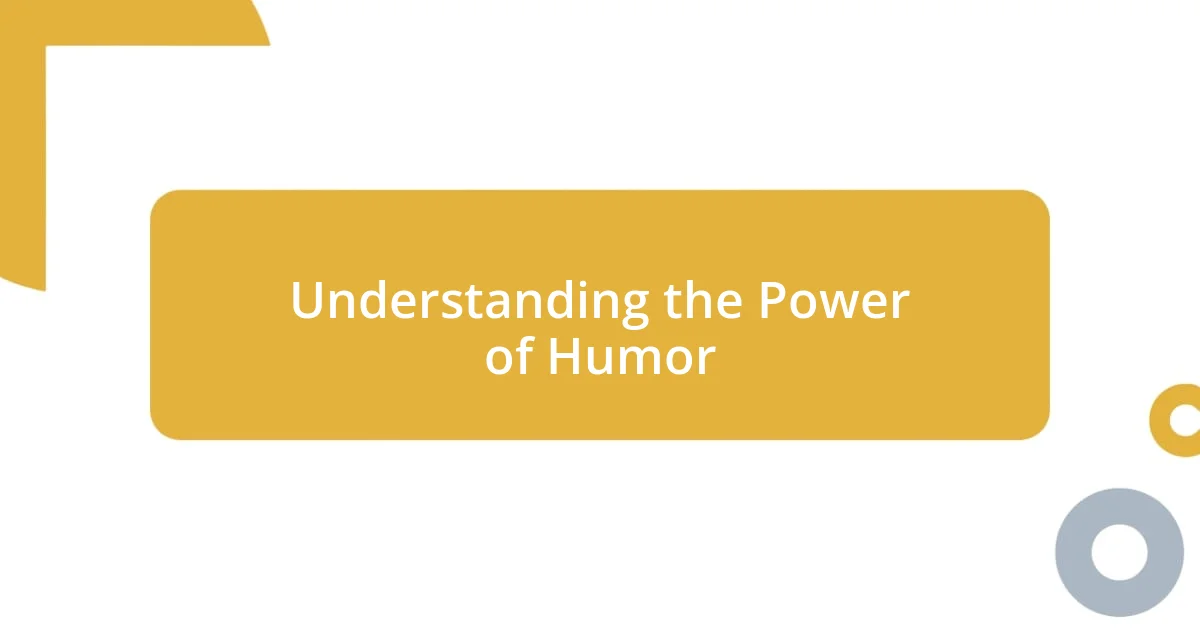
Understanding the Power of Humor
Humor is a universal language that bridges gaps between people, creating a sense of connection that often feels effortless. I remember a time when I was at a networking event, feeling out of place among industry giants. A well-timed joke not only lightened the atmosphere but also sparked conversations, making me feel like I truly belonged.
In my experience, humor can defuse tension and ease difficult conversations. Once, during a heated meeting, I cracked a light-hearted joke about a common workplace mishap. The room erupted in laughter, shifting the mood from stressed to collaborative. This moment reminded me that laughter can serve as a powerful tool for emotional relief, making it easier to tackle serious issues together.
Have you ever noticed how humor can transform even the most mundane interactions into memorable experiences? I once shared a humorous story about a failed cooking experiment at a family gathering, and suddenly everyone was sharing their own kitchen disasters. This not only created moments of genuine laughter but also deepened our connections through shared vulnerability. Humor helps us lower our defenses, inviting others to share in our humanity, and that’s a beautiful thing.
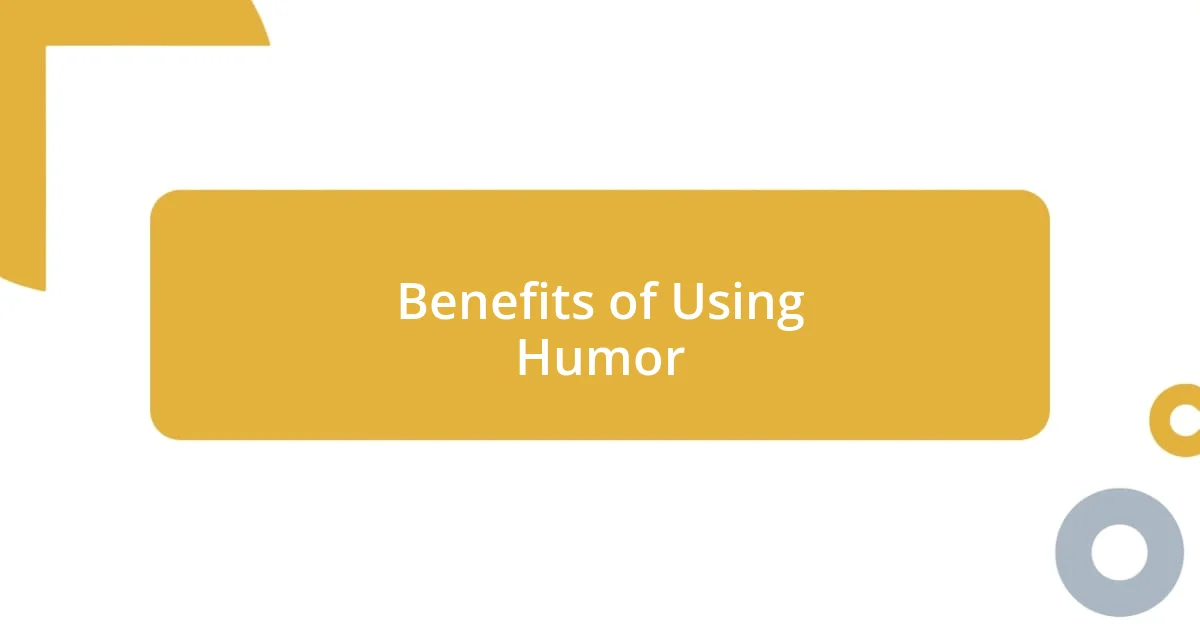
Benefits of Using Humor
Using humor brings a multitude of benefits that can enhance our connections with others. One of the standout advantages I’ve experienced is how it fosters a sense of belonging. At a recent friend’s gathering, I cracked a few playful jokes about our childhood. The room lit up with laughter, and suddenly, we were all reminiscing and sharing our embarrassing stories. It created a warm environment where everyone felt included, transforming acquaintances into friends.
Another remarkable benefit of humor is its ability to improve communication. Humor lightens the air and makes discussions more engaging. I once had a challenging conversation with a colleague about their project. Instead of diving straight into critiques, I opened with a humorous observation about a common hiccup we both faced. Not only did this disarm the tension, but it made my colleague more receptive to feedback. That conversation remains one of the most constructive I’ve had.
Finally, humor can improve our overall well-being. Just think about it—laughter releases endorphins, making us feel good. During a particularly stressful week, I joined a comedy night with friends. The shared laughter not only lifted our spirits but also strengthened our bond. I walked away feeling recharged and more connected to my friends, reinforcing how using humor can be a delightful remedy for stress.
| Benefit | My Experience |
|---|---|
| Fosters a Sense of Belonging | Childhood jokes at a gathering turned acquaintances into friends. |
| Improves Communication | A light-hearted comment opened a difficult conversation, making feedback easier to receive. |
| Enhances Well-Being | A comedy night with friends lifted our spirits and strengthened our connection. |
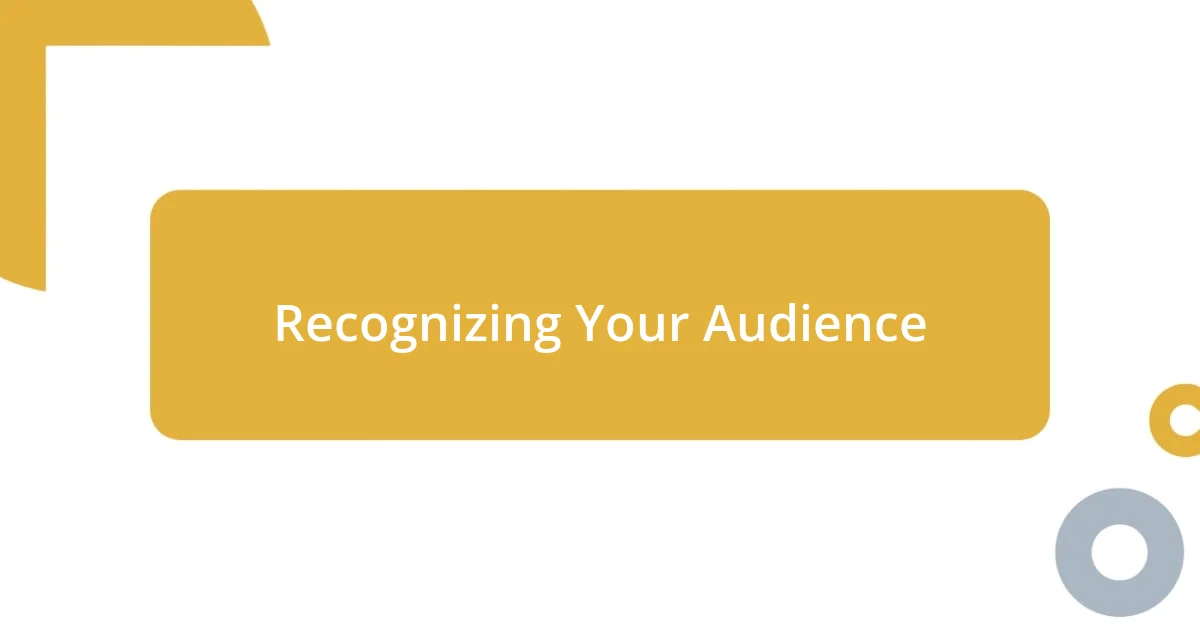
Recognizing Your Audience
Recognizing your audience is key to effectively connecting through humor. It’s fascinating how the same joke can land differently depending on who’s listening. I once attempted a light-hearted quip about adulting at a gathering of seasoned professionals, and the chuckle I expected turned into polite smiles. Understanding their experiences and preferences could have guided me to tailor my humor.
To ensure humor resonates, consider these aspects:
- Demographics: Age, profession, and cultural background all influence what jokes are relatable.
- Context: The setting matters—a workplace meeting calls for more professional humor, while a casual dinner allows for lightheartedness.
- Mood: The emotional state of your audience plays a huge role. If people are feeling tense, a gentle, relatable joke can ease tension effectively.
- Interests: Tailoring humor to shared interests can strengthen bonds. A sports-related joke hits differently with sports fans compared to a non-fan crowd.
Through trial and error, I’ve learned to gauge the room quickly, resulting in more impactful connections. For instance, at a community volunteer event, I shared a funny mishap from my early days in service. The laughter that followed broke down barriers and sparked a discussion about our shared experiences, illustrating how knowing your audience makes all the difference.
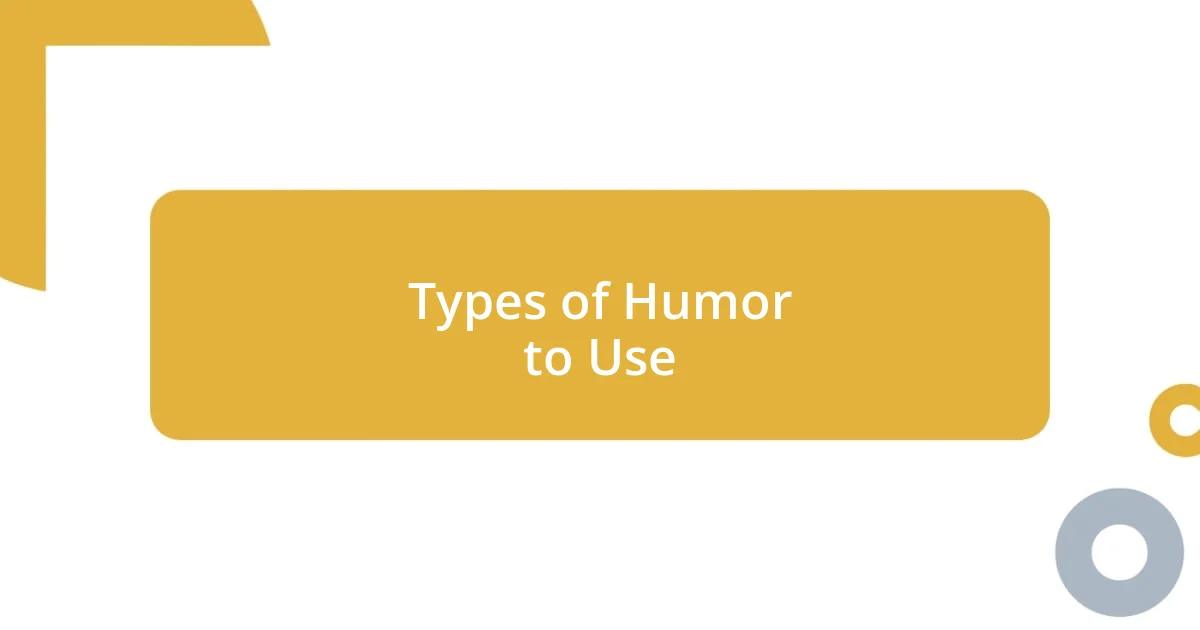
Types of Humor to Use
Humor comes in many flavors, and choosing the right type can make all the difference in connecting with others. For instance, self-deprecating humor is one I frequently rely on. I remember once at a family gathering, I jokingly recounted how I tried to impress everyone with my cooking skills, only to serve a burned pie. The laughter that followed created an atmosphere of openness, relieving any pressure for perfection. Isn’t it refreshing when someone can laugh at their own mistakes?
In addition to self-deprecation, observational humor is another powerful tool at my disposal. I often find humor in everyday situations. Just the other day, while waiting in line, I highlighted the absurdity of how some people act like the cashier is a runway model. Everyone around me chuckled, instantly bonding over a shared experience. Have you ever noticed how common experiences can push us closer together? It’s like humor acts as a glue, strengthening our connections through shared laughter.
Puns can be a hit or miss, but when used effectively, they add a delightful twist to any conversation. I once joked about my friend’s gardening skills, saying they were so good that even the weeds need vacation days. The whole table erupted in laughter! This light-hearted play on words not only brightened the mood but also showcased our shared appreciation for gardening. Who doesn’t enjoy a little wordplay now and then? By sprinkling in puns, I find that moments of silliness can truly mark a memorable connection.
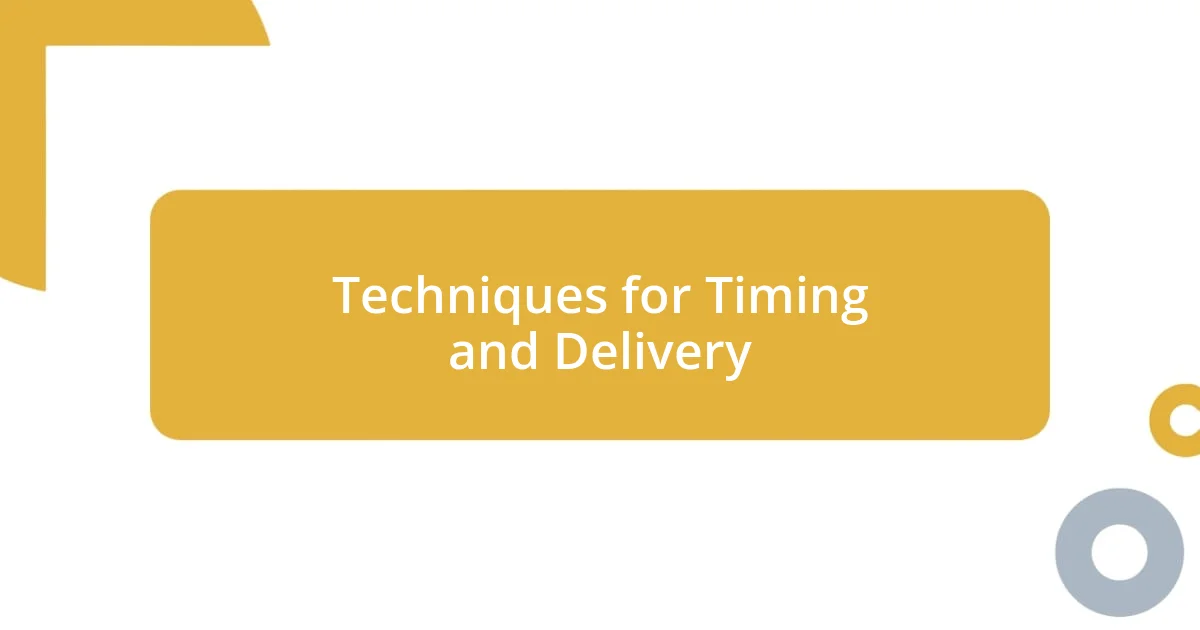
Techniques for Timing and Delivery
Timing can be everything when it comes to humor. I learned this the hard way during a presentation where I sprinkled in jokes throughout, only to realize that I was losing my audience’s attention. I found that waiting for the perfect moment—like a brief pause in a conversation—lets laughter resonate better. It’s as if the joke takes on a life of its own when it lands just right. Have you ever felt the energy shift in a room right before a punchline?
Delivery is another critical aspect; how I say something can enhance or diminish the humor. For instance, I once shared a goofy story about a time I tried to learn to dance. Instead of just telling the events, I adopted silly voices and exaggerated movements. The laughter didn’t just come from the punchline; it snowballed from my animated delivery. Isn’t it amazing how much your body language can amplify the humor?
Pauses are my secret weapon. During a recent dinner party, after recounting a particularly embarrassing moment from college, I paused before revealing the punchline. The anticipation was palpable, and that buildup created a wave of laughter when I finally delivered it. I often find that taking a moment to let tension linger can lead to a more explosive reaction. How do you feel during those silent moments of suspense? Sometimes, the silence speaks louder than the words themselves.
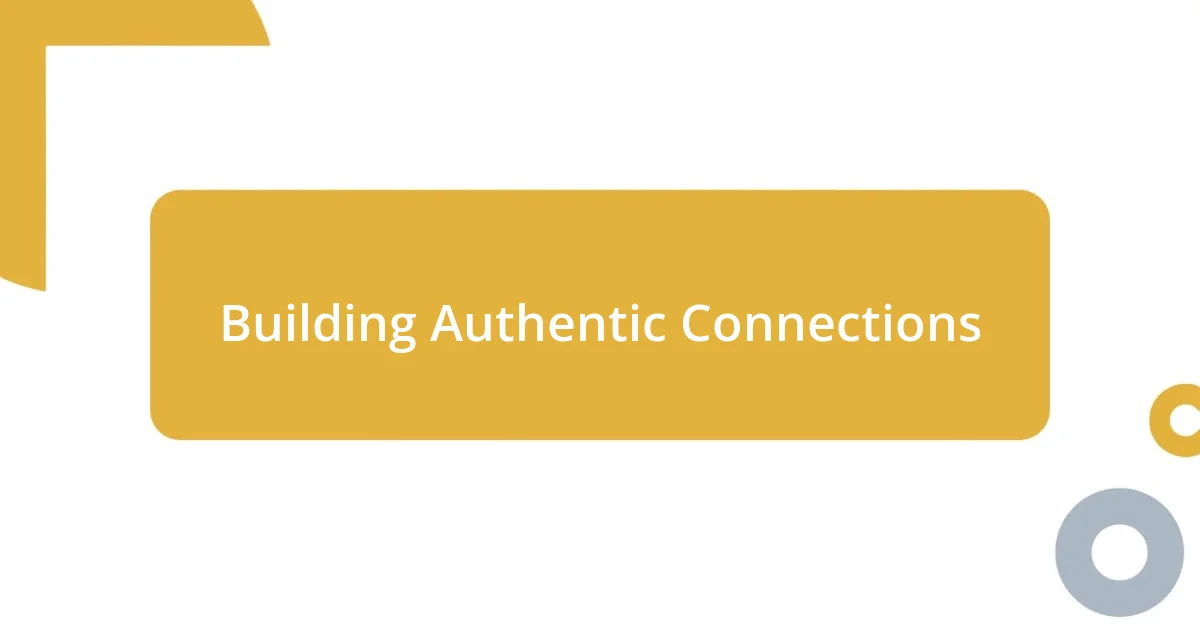
Building Authentic Connections
Building authentic connections often springs from vulnerability, which is where humor plays a pivotal role. I recall a time at work when I accidentally sent a colleague an email meant for my dog sitter. I made a joke about my “dog’s busy schedule,” and instead of feeling embarrassed, we all shared a hearty laugh. It transformed the atmosphere in the office, pulling us closer together, showing that we could all embrace imperfections.
Humor also helps lower barriers in social situations. Once, at a wedding where I barely knew anyone, I cracked a light-hearted joke about my dance moves being akin to a “baby deer on ice.” Suddenly, laughter broke the ice—people I had never met were approaching me to share their own dance fail stories. Isn’t it funny how laughter can quickly turn strangers into friends?
In my experience, laughter gives us a safe space. For instance, when I faced a challenging time, I decided to share a humorous perspective on my struggles during a casual get-together. By making light of my situation, the heartfelt responses I received were profound. It’s incredible how humor can create a genuine dialogue—inviting others to connect and reflect on shared experiences. Isn’t it remarkable how a dash of humor leads us to deeper conversations and connection?
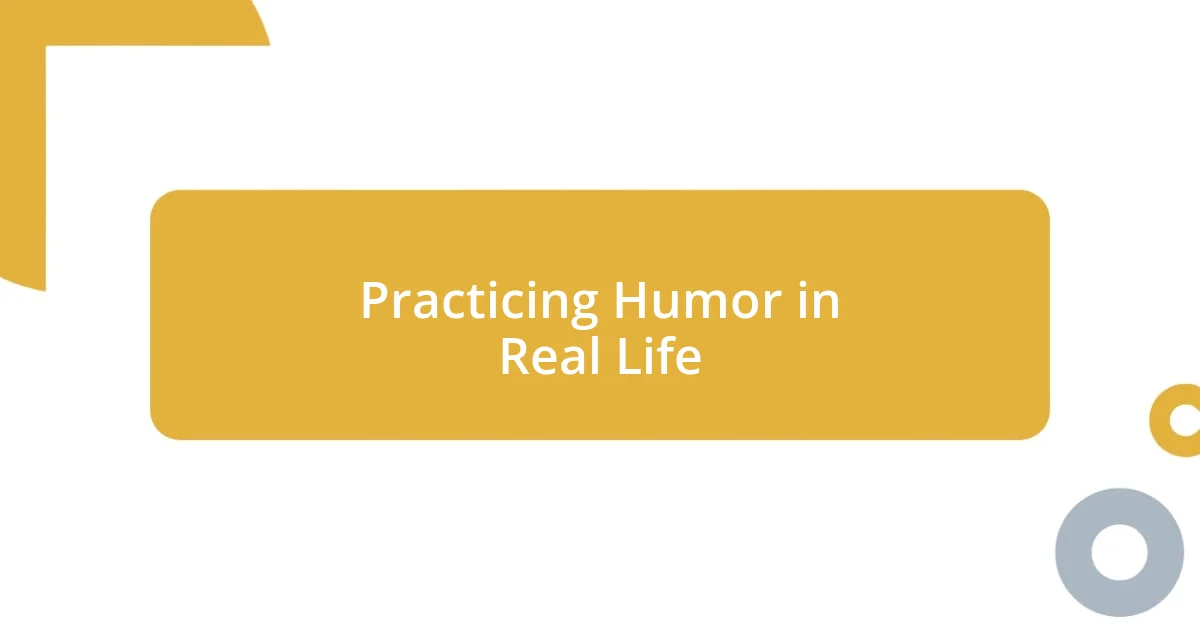
Practicing Humor in Real Life
Practicing humor in real life means seizing those spontaneous moments to lighten the mood. I remember a family gathering where my cousin accidentally spilled spaghetti all over herself. In that split second, I quipped, “Well, now we know who the real pasta artist is!” The laughter that erupted not only alleviated the embarrassment but also deepened our bond as we all shared a light-hearted moment. Isn’t it fascinating how a little humor can turn a slip-up into a cherished memory?
I find that humor is often the best tool for navigating awkward situations. A while back, I was stuck in an elevator with a group of strangers, and the tension was palpable. Instead of silently shifting my weight, I joked, “I didn’t know I’d be auditioning for a reality show on trapped elevators today!” The laughter that followed shifted the atmosphere from anxious to relaxed, allowing us to chat casually as we waited for the doors to open. Have you ever tried using humor to bridge the uncomfortable gap in a social setting?
Embracing humor in daily life also means being attuned to the world around me. The other day, while stuck in traffic, I spotted a jogger running alongside the cars, looking a bit too serious about their fitness regime. I thought, “Do they not know we’re on the struggle bus?” This simple, silly thought made me chuckle and brightened my mood amidst the chaos. How often do you find humor in the everyday moments that catch you off guard? Those little insights can transform frustrating situations into a lighter experience, reminding us not to take life too seriously.














